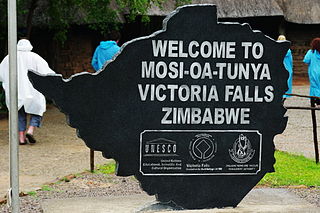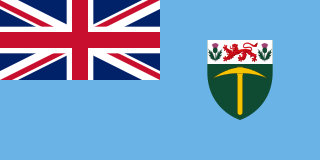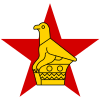Until roughly 2,000 years ago, what would become Zimbabwe was populated by ancestors of the San people. Bantu inhabitants of the region arrived and developed ceramic production in the area. A series of trading empires emerged, including the Kingdom of Mapungubwe and Kingdom of Zimbabwe. In the 1880s, the British South Africa Company began its activities in the region, leading to the colonial era in Southern Rhodesia.

Rhodesia, officially from 1970 the Republic of Rhodesia, was an unrecognised state in Southern Africa from 1965 to 1979. During this fourteen-year period, Rhodesia served as the de facto successor state to the British colony of Southern Rhodesia, and in 1980 it became modern day Zimbabwe.

Northern Rhodesia was a British protectorate in Southern Africa, now the independent country of Zambia. It was formed in 1911 by amalgamating the two earlier protectorates of Barotziland-North-Western Rhodesia and North-Eastern Rhodesia. It was initially administered, as were the two earlier protectorates, by the British South Africa Company (BSAC), a chartered company, on behalf of the British Government. From 1924, it was administered by the British Government as a protectorate, under similar conditions to other British-administered protectorates, and the special provisions required when it was administered by BSAC were terminated.

Southern Rhodesia was a landlocked, self-governing British Crown colony in Southern Africa, established in 1923 and consisting of British South Africa Company (BSAC) territories lying south of the Zambezi River. The region was informally known as South Zambesia until annexation by Britain, at the behest of Cecil Rhodes's British South Africa Company. The bounding territories were Bechuanaland (Botswana), Northern Rhodesia (Zambia), Portuguese Mozambique (Mozambique) and the Transvaal Republic.
Land reform in Zimbabwe officially began in 1980 with the signing of the Lancaster House Agreement, as a program to redistribute farmland from white Zimbabweans to black Zimbabweans as an effort by the ZANU-PF government to give more control over the country's extensive farmlands to the black African majority. Before the implementation of these policies, the distribution of land in what was then known as Rhodesia saw a population of 4,400 white Rhodesians owning 51% of the country's land while 4.3 million black Rhodesians owned 42%, with the remainder being non-agricultural land. The discrepancy of this distribution, as well as the overall dominance of the white population in the newly-independent but largely unrecognized Rhodesian state was challenged by the black nationalist organizations ZANU and ZAPU in the Rhodesian Bush War. At the establishment of the modern Zimbabwean state in 1980 after the bush war, the Lancaster House Agreement held a clause that prohibited forced transfer of land, this resulted in changes in land distribution from the willing sale or transfer by owners being minor until 2000, when the government of Robert Mugabe began a more aggressive policy.

The Rhodesian Front (RF) was a conservative political party in Southern Rhodesia, subsequently known as Rhodesia. Formed in March 1962 by white Rhodesians opposed to decolonisation and majority rule, it won that December's general election and subsequently spearheaded the country's Unilateral Declaration of Independence (UDI) from the Federation of Rhodesia and Nyasaland in 1965, remaining the ruling party and upholding white minority rule through the majority of the Bush War until 1979. Initially led by Winston Field, the party was led through most of its lifetime by co-founder Ian Smith. Following the end of the Bush War and the country's reconstitution as Zimbabwe, it changed its name to the Republican Front in 1981.

Sir Roland "Roy" Welensky was a Northern Rhodesian politician and the second and last Prime Minister of the Federation of Rhodesia and Nyasaland.

The British South Africa Company was chartered in 1889 following the amalgamation of Cecil Rhodes' Central Search Association and the London-based Exploring Company Ltd, which had originally competed to capitalize on the expected mineral wealth of Mashonaland but united because of common economic interests and to secure British government backing. The company received a Royal Charter modelled on that of the British East India Company. Its first directors included The 2nd Duke of Abercorn, Rhodes himself, and the South African financier Alfred Beit. Rhodes hoped BSAC would promote colonisation and economic exploitation across much of south-central Africa, as part of the "Scramble for Africa". However, his main focus was south of the Zambezi, in Mashonaland and the coastal areas to its east, from which he believed the Portuguese could be removed by payment or force, and in the Transvaal, which he hoped would return to British control.

The British South Africa Police (BSAP) was, for most of its existence, the police force of Southern Rhodesia and Rhodesia. It was formed as a paramilitary force of mounted infantrymen in 1889 by Cecil Rhodes' British South Africa Company, from which it took its original name, the British South Africa Company's Police. Initially run directly by the company, it began to operate independently in 1896, at which time it also dropped "Company's" from its name. It thereafter served as Rhodesia's regular police force, retaining its name, until 1980, when it was superseded by the Zimbabwe Republic Police, soon after the country's reconstitution into Zimbabwe in April that year.
The Southern Rhodesia African National Congress (SRANC) was a political party active between 1957–1959 in Southern Rhodesia. Committed to the promotion of indigenous African welfare, it was the first fully fledged black nationalist organisation in the country. While short-lived — it was outlawed by the predominantly white minority government in 1959 — it marked the beginning of political action towards black majority rule in Southern Rhodesia, and was the original incarnation of the National Democratic Party (NDP); the Zimbabwe African People's Union (ZAPU); the Zimbabwe African National Union (ZANU); and the Zimbabwe African National Union — Patriotic Front (ZANU–PF), which has governed Zimbabwe continuously since 1980. Many political figures who later became prominent, including Robert Mugabe and Joshua Nkomo, were members of the SRANC.

The military history of Zimbabwe chronicles a vast time period and complex events from the dawn of history until the present time. It covers invasions of native peoples of Africa, encroachment by Europeans, and civil conflict.

Many languages are spoken, or historically have been spoken, in Zimbabwe. Since the adoption of its 2013 Constitution, Zimbabwe has 16 official languages, namely Chewa, Chibarwe, English, Kalanga, Koisan, Nambya, Ndau, Ndebele, Shangani, Shona, sign language, Sotho, Tonga, Tswana, Venda, Xhosa. The country's main languages are Shona, spoken by over 70% of the population, and Ndebele, spoken by roughly 20%. English is the country's lingua franca, used in government and business and as the main medium of instruction in schools. English is the first language of most white Zimbabweans, and is the second language of a majority of black Zimbabweans. Historically, a minority of white Zimbabweans spoke Afrikaans, Greek, Italian, Polish, and Portuguese, among other languages, while Gujarati and Hindi could be found amongst the country's Indian population. Deaf Zimbabweans commonly use one of several varieties of Zimbabwean Sign Language, with some using American Sign Language. Zimbabwean language data is based on estimates, as Zimbabwe has never conducted a census that enumerated people by language.
Europeans first came to the region in southern Africa today called Zimbabwe in the sixteenth century, when Portuguese colonials ventured inland from Mozambique and attacked the Kingdom of Mutapa, which then controlled an area roughly equivalent to eastern Zimbabwe and western Mozambique. Portuguese influence over Mutapa endured for about two centuries before fading away during the 1690s and early-1700s (decade). During the year of 1685, French Huguenots emigrated to present-day South Africa and whilst some settled there, others moved further north into the continent. Those who did, settled within modern-day Zimbabwe, Mozambique and Botswana, and co-existed with the indigenous people; most of whom, in Zimbabwe, were the Naletale people.

The Federation of Rhodesia and Nyasaland, also known as the Central African Federation (CAF), was a colonial federation that consisted of three southern African territories: the self-governing British colony of Southern Rhodesia and the British protectorates of Northern Rhodesia and Nyasaland. It existed between 1953 and 1963.

Zimbabwe and the Commonwealth of Nations have had a controversial and stormy diplomatic relationship. Zimbabwe is a former member of the Commonwealth, having withdrawn in 2003, and the issue of Zimbabwe has repeatedly taken centre stage in the Commonwealth, both since Zimbabwe's independence and as part of the British Empire.

The modern political history of Zimbabwe starts with the arrival of white people to what was dubbed Southern Rhodesia in the 1890s. The country was initially run by an administrator appointed by the British South Africa Company. The prime ministerial role was first created in October 1923, when the country achieved responsible government, with Sir Charles Coghlan as its first Premier. The third premier, George Mitchell, renamed the post prime minister in 1933.

The British South Africa Company's administration of what became Rhodesia was chartered in 1889 by Queen Victoria of the United Kingdom, and began with the Pioneer Column's march north-east to Mashonaland in 1890. Empowered by its charter to acquire, govern and develop the area north of the Transvaal in southern Africa, the Company, headed by Cecil Rhodes, raised its own armed forces and carved out a huge bloc of territory through treaties, concessions and occasional military action, most prominently overcoming the Matabele army in the First and Second Matabele Wars of the 1890s. By the turn of the century, Rhodes's Company held a vast, land-locked country, bisected by the Zambezi river. It officially named this land Rhodesia in 1895, and ran it until the early 1920s.

The Monckton Commission, officially the Advisory Commission for the Review of the Constitution of the Federation of Rhodesia and Nyasaland, was set up by the British government under the chairmanship of Walter Monckton, 1st Viscount Monckton of Brenchley, in 1960. Its purpose was to investigate and make proposals for the future of the Federation of Rhodesia and Nyasaland, made up of Southern Rhodesia, Northern Rhodesia and Nyasaland—respectively equivalent to today's Zimbabwe, Zambia and Malawi.

Zimbabwean nationality law is regulated by the Constitution of Zimbabwe, as amended; the Citizenship of Zimbabwe Act, and its revisions; and various international agreements to which the country is a signatory. These laws determine who is, or is eligible to be, a Zimbabwean national. The legal means to acquire nationality, formal legal membership in a nation, differ from the domestic relationship of rights and obligations between a national and the nation, known as citizenship. Nationality describes the relationship of an individual to the state under international law, whereas citizenship is the domestic relationship of an individual within the nation. Commonwealth countries often use the terms nationality and citizenship as synonyms, despite their legal distinction and the fact that they are regulated by different governmental administrative bodies. Zimbabwean nationality is typically obtained under the principal of jus sanguinis, i.e. by birth to parents with Zimbabwean nationality. It can be granted to persons with an affiliation to the country, or to a permanent resident who has lived in the country for a given period of time through registration, a process known elsewhere as naturalisation.

Rhodesia, was a self-governing British Crown colony in southern Africa. Until 1964, the territory was known as Southern Rhodesia, and less than a year before the name change the colony formed a part of the Federation of Rhodesia and Nyasaland and hosted its capital city, Salisbury. On 1 January 1964, the three parts of the Federation became separate colonies as they had been before the founding of the Federation on 1 August 1953. The demise of the short-lived union was seen as stemming overwhelmingly from black nationalist movements in Northern Rhodesia and Nyasaland, and both colonies were fast-tracked towards independence - Nyasaland first, as Malawi, on 6 July 1964 and Northern Rhodesia second, as Zambia, on 24 October. Southern Rhodesia, by contrast, stood firmly under white government, and its white population, which was far larger than the white populations elsewhere in the erstwhile Federation, was, in general, strongly opposed to the introduction of black majority rule. The Southern Rhodesian prime minister, Winston Field, whose government had won most of the federation's military and other assets for Southern Rhodesia, began to seek independence from the United Kingdom without introducing majority rule. However, he was unsuccessful and his own party, the Rhodesian Front, forced him to resign. Days prior to his resignation, on Field's request, Southern Rhodesia had changed its flag to a sky blue ensign defaced with the Rhodesian coat of arms, becoming the first British colony to use a sky blue ensign instead of a dark blue one.

















